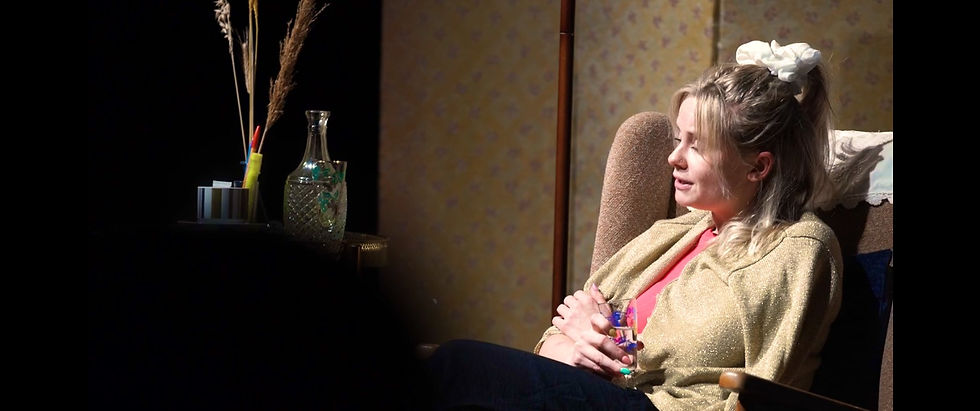Review: Sophie (Bitesize Festival/Riverside Studios)
- Sam - Admin

- Jul 10, 2023
- 3 min read
Growing up with a sibling can be challenging – attention and affection must be shared, finances need to be stretched more thinly to provide for more than one child, and favouritism from adults can become difficult to avoid. When one of the siblings has a disability, these issues can carry a heavier, more affecting weight. Sophie, a show written by the titular Sophie and her sister Emily, explores the lives of the two sisters as they grew up, side by side, but increasingly far apart.
The sisters, founders of production company Down the Lens, have created several works focused on disabled representation, alongside individual achievements – Emily has written short films alongside her work as an SEN nanny, while Sophie has achieved one of her lifelong dreams in posing for a shoot with Cosmopolitan. Sophie has Down syndrome, as we learn early in this one-woman play, and grew up loved and supported, but with a family who were still learning what this meant for her.

Not a true one-woman show, as Sophie herself does join her sister for the opening and closing scenes, as well as having a handful of brief, offstage roles from her front row seat, Emily nevertheless carries the bulk of the narrative. Emily is a strong performer, and an immediately charming presence. Doing 90% or more of the talking for the hour, she transforms herself effectively into a handful of other family members and friends, while also convincingly portraying herself at different ages.
The transformative performance, in particular the frustrated teen years where the actor seems to regress to that age before our eyes, helps to sell the breakneck pace of parts of the script. With only an hour to cover from Sophie’s 1989 birth to 2019, at her 30th birthday party, a degree of shorthand is needed that Emily helps to clarify. The sisters have also pulled together collections of home videos and media clips from the time periods – the second Coyote Ugly flashed across the screen I knew without a doubt we had moved to the noughties.

A deeply moving piece of autobiographical writing, my only concern was that this show didn’t really have a strong narrative thrust to move it towards any real conclusion. Emily grows frustrated with Sophie as they grow older and she wants to explore the things her friends are exploring, and the topic of Sophie’s more naïve outlook on things and not understanding why there are different rules for her and her younger sister, but neither is centred in the narrative. In making the piece fully and genuinely autobiographical, individual stories that could become full pieces in and of themselves can feel brushed past.
One scene, fictionalised in that it is being re-enacted by the sisters, is shown to us as a video. Sophie flirts with a boy over the phone and is about to send him a risqué photo when Emily intercepts – the resulting discussion leaves Emily unsure how to explain why Sophie can’t do everything she does, and, onstage, Emily wonders if she could have handled the situation better. I’m unsure of why this particular scene was presented this way, but it did make me wonder if there was more power to be fund in refocusing on more specific moments in their lives.

Sophie has clearly been created from a place of sisterly love, and there is real joy in seeing the two of them take a bow together, and in seeing how truly devoted they are to one another. While I was left wanting in terms of a more traditional narrative, this piece was intended as autobiographical from the outset, and its sometimes breezy, sometimes wounded, but often cheerful outlook is far from unwelcome, and may be exactly the kind of joyous representation of disabled people we ought to see more of.
⭐️⭐️⭐️
Sophie will be following this appearance as part of Riverside Studios' Bitesize Festival with a run at the Edinburgh Fringe Festival.
For tickets and information visit https://www.downthelens.co.uk


(3).jpg)